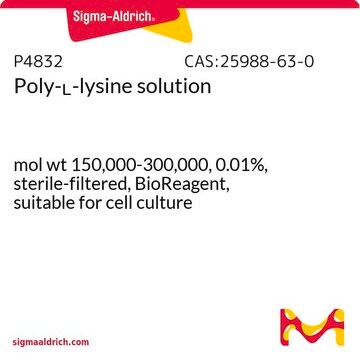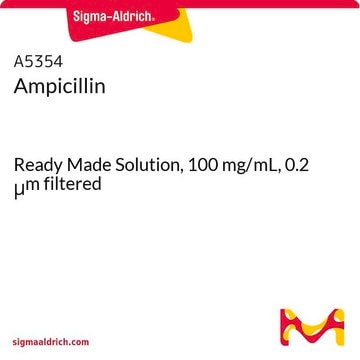Recommended Products
form
lyophilized powder
extent of labeling
~4 μmol per mL
technique(s)
affinity chromatography: suitable
matrix
Sepharose 4B
matrix activation
cyanogen bromide
matrix attachment
α-amino
matrix spacer
1 atom
suitability
suitable for chromatography
storage temp.
2-8°C
Looking for similar products? Visit Product Comparison Guide
Application
L-lysine-agarose is used in protein chromatography, affinity chromatography and amino acid resins. L-lysine-agarose has been used to study mitogen-activated protein kinase (MAPK) cascades in abscisic acid (ABA) signal transduction pathways as well as to study the regulation of phosphorylation of tau protein in the brain.
Physical form
Lyophilized powder stabilized with lactose and dextran
related product
Product No.
Description
Pricing
Storage Class Code
11 - Combustible Solids
WGK
WGK 3
Flash Point(F)
Not applicable
Flash Point(C)
Not applicable
Personal Protective Equipment
dust mask type N95 (US), Eyeshields, Gloves
Certificates of Analysis (COA)
Search for Certificates of Analysis (COA) by entering the products Lot/Batch Number. Lot and Batch Numbers can be found on a product’s label following the words ‘Lot’ or ‘Batch’.
Already Own This Product?
Find documentation for the products that you have recently purchased in the Document Library.
P Saxena et al.
Investigative ophthalmology & visual science, 41(6), 1473-1481 (2000-05-08)
With age, human lens crystallins become more pigmented, oxidized, modified by ascorbate oxidation and advanced glycation end products (AGEs), and bind copper. The hypothesis was tested that the major AGE and ascorbylation product in the human lens, N(epsilon)-carboxymethyl-L-lysine (CML), has
V J Christiansen et al.
Arteriosclerosis, thrombosis, and vascular biology, 17(1), 164-171 (1997-01-01)
Deposition of the terminal complement proteins (C5b-9) on human endothelial cells can result in cell lysis or nonlytic alterations of cell function including procoagulant responses. Because regulation of fibrinolysis is a central endothelial function and because C9 contains a carboxyl-terminal
L Y Cheng et al.
Neurochemical research, 26(4), 425-438 (2001-08-10)
Phosphatases extracted from a human brain were resolved into two main groups, namely affi-gel blue-binding phosphatases and affi-gel blue-nonbinding phosphatases. Affi-gel blue binding phosphatases were further separated into four different phosphatase activities, designated P1-P4, and described previously. In the present
Haidong Ding et al.
Planta, 230(2), 239-251 (2009-05-09)
Mitogen-activated protein kinase (MAPK) cascades have been shown to be important components in abscisic acid (ABA) signal transduction pathway. In this study, a 46 kDa MAPK (p46MAPK) induced by ABA was partially purified from maize (Zea mays) by Q-Sepharose FF
L Y Cheng et al.
Neurochemical research, 25(1), 107-120 (2000-02-24)
Implication of protein phosphatases in Alzheimer disease led us to a systemic investigation of the identification of these enzyme activities in human brain. Human brain phosphatases eluted from DEAE-Sephacel with 0.22 M NaCl were resolved into two main groups by
Our team of scientists has experience in all areas of research including Life Science, Material Science, Chemical Synthesis, Chromatography, Analytical and many others.
Contact Technical Service







